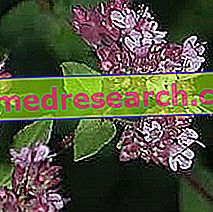
Scientific name
Origanum majorana
Family
Labiatae
Origin
Africa, Asia
Used Parts
Drug consisting of flowering tops
Chemical constituents
- Flavonoids;
- Tannins;
- Bitter substances;
- Essential oil (monoterpenes and terpineol);
- Arbutin;
- Hydroquinone.
Marjoram in Herbal Medicine: Properties of Marjoram
Marjoram is certainly known for its culinary use as a spice; the essential oil and flavonoids present in the leaves and flowers have antispastic activity and favor the digestive processes; it is recommended only as a condiment.
The essential oil in vitro has shown antibacterial and fungicidal activity.
Biological activity
Although the use of marjoram has not been officially approved for any type of therapeutic application, this plant is attributed with numerous properties, such as: diuretic, digestive, carminative, antispasmodic, anti-inflammatory and emmenagogue. In fact, it is not uncommon for the plant to be included in the composition of herbal teas with indications for digestive disorders, flatulence, diarrhea, migraine and headache; while it is used externally as a balsamic, expectorant and anti-inflammatory remedy. For more detailed information on these uses of marjoram (however, not officially approved), see the article on "Marjoram in Tisane".
From some studies conducted in vitro, however, it has emerged that marjoram has insecticidal, antimicrobial and antiviral activity.
Moreover, the potential antitumor activities of the plant were also investigated. In this regard, in vitro and in vivo studies have highlighted the ability of marjoram ethanolic extract to inhibit growth and induce apoptosis in malignant cells constituting a metastatic breast tumor. These activities seem to be exercised through the modulation of the expression and activity of proteins implicated in the processes of angiogenesis and invasion and cell migration.
Another interesting and recent study conducted on animals (2016), instead, showed that marjoram ethanolic extract is able to reduce oxidative damage and nephrotoxicity induced by cisplatin-based anticancer therapy. This action seems to be exercised through a mechanism of free-radical scavenger explained, in fact, from the extract of the plant.
The result of this study suggests a possible use of marjoram in conjunction with cisplatin treatment, in order to reduce its toxicity and improve the quality of life of patients undergoing anticancer therapy. However, further and more in-depth studies have yet to be conducted on this, before a similar medical application of the plant can be approved.
Marjoram in folk medicine and homeopathy
In folk medicine, marjoram and its essential oil are used to treat a wide variety of disorders, such as gastrointestinal disorders, cramps, dizziness, depression, migraine, neurasthenia, colds and paroxysmal cough. Furthermore, the plant is also used in traditional medicine to promote diuresis.
Marjoram is also used in homeopathic settings, where it can easily be found in the form of granules and mother tinctures. In homeopathic medicine this plant is used in case of mood disorders, nymphomania and excessive sexual arousal.
The dose of homeopathic remedy to be taken can vary from one individual to another, also depending on the type of disorder that needs to be treated and the type of homeopathic preparation and dilution that you want to use.
Contraindications
Avoid taking in the event of hypersensitivity to one or more components.
The use of marjoram is also contraindicated in infants and young children.
Pharmacological Interactions
- not known
Marjoram - Warnings
Caution in the use of essential oil of marjoram by mouth.



